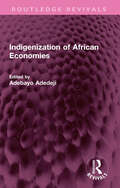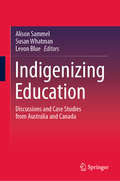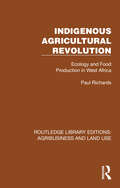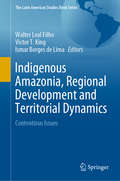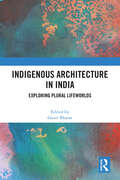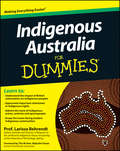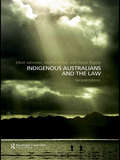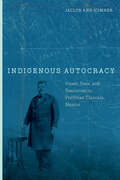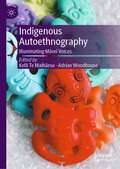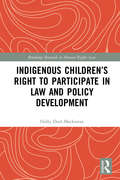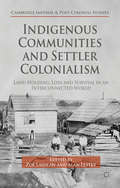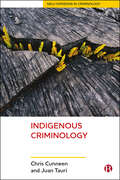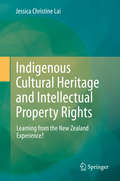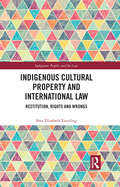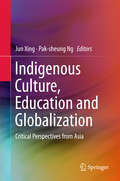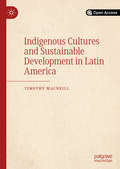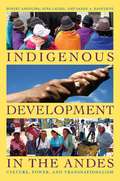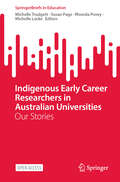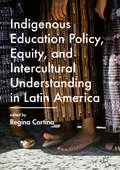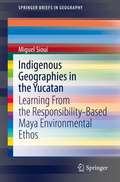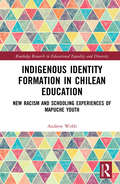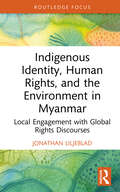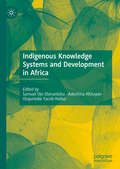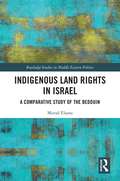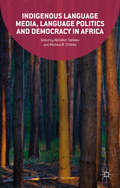- Table View
- List View
Indigenization of African Economies (Routledge Revivals)
by Adebayo AdedejiOriginally published in 1981, this book examines the progress of a number of national efforts to move towards economic self-reliance. It consists of case studies from Egypt, Zambia, Ghana, Nigeria, Kenya, Tanzania, Ethiopia, Botswana, Lesotho and Swaziland and Senegal. The studies are set in a framework that outlines the historical background to African economic dependence, and they discuss the theoretical and practical implications of that dependence. It makes an important contribution to the study of indigenization, bringing together a group of African specialists writing from the inside, and articulating the continent’s challenges with convincing authority.
Indigenizing Education: Discussions and Case Studies from Australia and Canada
by Alison Sammel Susan Whatman Levon BlueThis book provides invaluable guidance for community, school and university-based educators who are evaluating their educational philosophies and practices to support Indigenizing education. The examples from Australia and Canada shared in this book illustrate how Indigenous and non-Indigenous educators have worked together to Indigenize their educational practices, showcasing community empowerment and reconciliation agendas. It also enables beginning educators to gain a meaningful and critical understanding of what Indigenizing education can mean in their own future practice.
Indigenous Agricultural Revolution: Ecology and Food Production in West Africa (Routledge Library Editions: Agribusiness and Land Use #21)
by Paul RichardsOriginally published in 1985, this book argues forcefully and practically for new relationship between science and the small farmer. It advocates scientific research seeking out changes which are already taking place within the smallholder farming sector and building on local initiatives. Drawing on his experience of West Africa, the author demonstrates that many of the most successful innovations in food-crop production during the 20th century have indigenous roots and that there should therefore be less emphasis on ‘teaching’ farmers how to farm and more emphasis on how to foster and support local adaptation and inventiveness. This book will be of interest to students of agriculture, environmental studies and rural development as well as those working with relief and development agencies.
Indigenous Amazonia, Regional Development and Territorial Dynamics: Contentious Issues (The Latin American Studies Book Series)
by Victor T. King Walter Leal Filho Ismar Borges de LimaThis book brings together a valuable collection of case studies and conceptual approaches that outline the present state of Amazonia in the 21st century. The many problems are described and the benefits, as well as the achievements of regional development are also discussed. The book focuses on three themes for discussion and recommendations: indigenous peoples, their home (the forest), and the way(s) to protect and sustain their natural home (biodiversity conservation). Using these three themes this volume offers a comprehensive critical review of the facts that have been the reality of Amazonia and fills a gap in the literature.The book will appeal to scholars, professors and practitioners. An outstanding group of experienced researchers and individuals with detailed knowledge of the proposed themes have produced chapters on an array of inter-related issues to demonstrate the current situation and future prospects of Amazonia. Issues investigated and debated include: territorial management; indigenous territoriality and land demarcation; ethnodevelopment; indigenous higher education and capacity building; natural resource appropriation; food security and traditional knowledge; megadevelopmental projects; indigenous acculturation; modernization of Amazonia and its regional integration; anthropogenic interventions; protected areas and conservation; political ecology; postcolonial issues, and the sustainability of Amazonia.
Indigenous Architecture in India: Exploring Plural Lifeworlds
by Gauri BharatThis volume focuses on socio- spatial practices of indigenous communities in India. It explores the interrelation between the built environments and lifeworlds, i.e. practices, patterns, and structures of everyday life. The chapters deal with different ideas and definitions of indigeneity, while also addressing the complex equations between the production and perception of built forms, indigenous technologies, on the one hand, and social, environmental and political contexts, questions of aesthetics, identity, and self-representation on the other.From Adivasi art and sacred sites to craft villages and nomadic pastoralists in western India, from indigenous bangle makers in urban north India to terracotta crafts people on the south, each chapter focuses on different communities and the contours of their contemporary lifeworlds. The contributions actively attempt to foreground the logic and perspectives of the communities themselves as the epistemological centre of the architectural and material discourses on indigeneity.This book will be useful for students, teachers, and researchers of architecture, urban design, urban studies, urban development and planning, anthropology, sociology, and museum studies. It will also be of interest to urban planners and designers, policy planners, local government authorities, and professionals engaged in the discipline.
Indigenous Australia for Dummies (For Dummies Ser.)
by Larissa BehrendtA comprehensive, relevant, and accessible look at all aspects of Indigenous Australian history and culture What is The Dreaming? How many different Indigenous tribes and languages once existed in Australia? What is the purpose of a corroboree? What effect do the events of the past have on Indigenous peoples today? Indigenous Australia For Dummies answers these questions and countless others about the oldest race on Earth. It explores Indigenous life in Australia before 1770, the impact of white settlement, the ongoing struggle by Aboriginal and Torres Strait Islander peoples to secure their human rights and equal treatment under the law, and much more. Celebrating the contributions of Indigenous people to contemporary Australian culture, the book explores Indigenous art, music, dance, literature, film, sport, and spirituality. It discusses the concept of modern Indigenous identity and examines the ongoing challenges facing Indigenous communities today, from health and housing to employment and education, land rights, and self-determination. Explores significant political moments—such as Paul Keating's Redfern Speech and Kevin Rudd's apology, and more Profiles celebrated people and organisations in a variety of fields, from Cathy Freeman to Albert Namatjira to the Bangarra Dance Theatre and the National Aboriginal Radio Service Challenges common stereotypes about Indigenous people and discusses current debates, such as a land rights and inequalities in health and education This book will enlighten readers of all backgrounds about the history, struggles and triumphs of the diverse, proud, and fascinating peoples that make up Australia's Indigenous communities. With a foreword by former PM Malcolm Fraser, Indigenous Australia For Dummies is a must-read account of Australia's first people. 'Indigenous Australia For Dummies is an important contribution to the broad debate and to a better understanding of our past history. Hopefully it will influence future events.'—Former Prime Minister Malcolm Fraser
Indigenous Australians and the Law
by Elliott Johnston Martin Hinton Daryle RigneyBringing together a well-respected team of commentators, many of them indigenous Australians themselves, this revised and updated edition examines the legal, social and political developments that have taken place in Australia since the publication of the last edition. Providing students with a greater understanding of the issues facing Indigenous Australians in the hope of contributing to reconciliation, the authors explore a broad range of developments, including: human rights and reconciliation in contemporary Australia; the demise of ATSIC; issues of indigenous governance and water rights. Giving readers an incisive account of the resounding impact of social, political and legal conditions upon the Indigenous people of Australia and their interaction with and recourse to the law, this book is an excellent resource for those interested in the law of a coloniser or conqueror and its lasting impact upon first nations.
Indigenous Autocracy: Power, Race, and Resources in Porfirian Tlaxcala, Mexico
by Jaclyn SumnerWhen General Porfirio Díaz assumed power in 1876, he ushered in Mexico's first prolonged period of political stability and national economic growth—though "progress" came at the cost of democracy. Indigenous Autocracy presents a new story about how regional actors negotiated between national authoritarian rule and local circumstances by explaining how an Indigenous person held state-level power in Mexico during the thirty-five-year dictatorship that preceded the Mexican Revolution (the Porfiriato), and the apogee of scientific racism across Latin America. Although he was one of few recognizably Indigenous persons in office, Próspero Cahuantzi of Tlaxcala kept his position (1885–1911) longer than any other gubernatorial appointee under Porfirio Díaz's transformative but highly oppressive dictatorship (1876–1911). Cahuantzi leveraged his identity and his region's Indigenous heritage to ingratiate himself to Díaz and other nation-building elites. Locally, Cahuantzi navigated between national directives aimed at modernizing Mexico, often at the expense of the impoverished rural majority, and strategic management of Tlaxcala's natural resources—in particular, balancing growing industrial demand for water with the needs of the local population. Jaclyn Ann Sumner shows how this intermediary actor brokered national expectations and local conditions to maintain state power, challenging the idea that governors during the Porfirian dictatorship were little more than provincial stewards who repressed dissent. Drawing upon documentation from more than a dozen Mexican archives, the book brings Porfirian-era Mexico into critical conversations about race and environmental politics in Latin America.
Indigenous Autoethnography: Illuminating Māori Voices
by Kelli Te Maihāroa Adrian WoodhouseThis book opens new pathways for decolonial autoethnography, presented as a series of reflective stories that showcase how Māori have negotiated and navigated their personal and professional identities within contemporary society. Framed within the academic methodology of Indigenous Autoethnography, authors recount their personal and professional experiences to address their encounters with cultural trauma and personal enlightenment. As a culturally responsive methodology, Indigenous Autoethnography embraces reflective practice and critical awakening to validate Indigenous knowledge, ensuring that it remains meaningful and responsive to the needs of Māori. Utilising metaphorical storytelling as a primary means of sensemaking, this work reinforces the importance of Māori and other Indigenous People to seek wisdom from the past to guide them into the future. With Indigenous knowledge historically ignored and misrepresented in higher education, this seminal text provides invaluable guidance for global Indigenous researchers seeking to produce story work that genuinely encompasses physical, emotional, and spiritual dimensions.
Indigenous Children’s Right to Participate in Law and Policy Development (Routledge Research in Human Rights Law)
by Holly Doel-MackawayThis book presents a model for reforming and developing Indigenous related legislation and policy, not only in Australia, but also in other jurisdictions. The model provides guidance about how to seek, listen to and respond to the voices of Indigenous children and young people. The participation of Indigenous children and young people, when carried out in a culturally and age-appropriate way and based on free, prior and informed consent, is an invaluable resource capable of empowering children and young people and informing Indigenous related legislation and policy. This project contributes to the emerging field of robust, ethically sound, participatory research with Indigenous children and young people and proposes ways in which Australian and international legislators and policymakers can implement the principle of children’s participation by involving Aboriginal children and young people in the development of law and policy pertaining to their lives. This book provides accounts from Aboriginal children and young people detailing their views on how they can be involved in law and policy development in the future. It shows the latest state of knowledge on the topic and will be of interest to researchers, academics, policymakers, legislators, and students in the fields of human rights law, children’s rights, participation rights, Indigenous peoples’ law, and family, child and social welfare law.
Indigenous Communities and Settler Colonialism
by Alan Lester Zoë LaidlawThe new world created through Anglophone emigration in the 19th century has been much studied. But there have been few accounts of what this meant for the Indigenous populations. This book shows that Indigenous communities tenaciously held land in the midst of dispossession, whilst becoming interconnected through their struggles to do so.
Indigenous Criminology (New Horizons in Criminology)
by Chris Cunneen Juan TauriIndigenous Criminology is the first book to comprehensively explore Indigenous people’s contact with criminal justice systems in a contemporary and historical context. Drawing on comparative Indigenous material from North America, Australia and Aotearoa New Zealand, it addresses both the theoretical underpinnings to the development of a specific Indigenous criminology, and canvasses the broader policy and practice implications for criminal justice. Written by leading criminologists specialising in Indigenous justice issues, the book argues for the importance of Indigenous knowledges and methodologies to criminology, and suggests that colonialism needs to be a fundamental concept to criminology in order to understand contemporary problems such as deaths in custody, high imprisonment rates, police brutality and the high levels of violence in some Indigenous communities. Prioritising the voices of Indigenous peoples, the work will make a significant contribution to the development of a decolonising criminology and will be of wide interest.
Indigenous Cultural Heritage and Intellectual Property Rights
by Jessica Christine LaiNow more than ever, indigenous peoples' interests in their cultural heritage are in the spotlight. Yet, there is very little literature that comprehensively discusses how existing laws can and cannot be used to address indigenous peoples' interests. This book assesses how intangible aspects of indigenous cultural heritage (and the tangible objects that hold them) can be protected, within the realm of a broad range of existing legal orders, including intellectual property and related rights, consumer protection law, common law and equitable doctrines, and human rights. It does so by focusing on the New Zealand Māori. The book also looks to the future, analysing the long-awaited Wai 262 report, released in New Zealand by the Waitangi Tribunal in response to allegations that the government had failed in its duty to ensure that the Māori retain chieftainship over their tangible and intangible treasures, as required by the Treaty of Waitangi, signed between the Māori and the British Crown in 1840.
Indigenous Cultural Property and International Law: Restitution, Rights and Wrongs (Indigenous Peoples and the Law)
by Shea Elizabeth EsterlingExamining the restitution of cultural property to Indigenous Peoples in human rights law, this book offers a detailed analysis of the opportunities and constraints of international law as a tool of resistance and social transformation for marginalized groups. In accordance with an increasing insistence on respect for diverse cultures, and through their own international mobilization, Indigenous Peoples have participated in the construction of a distinct human rights framework. Significant academic inquiry has focused on the substantive gains made by Indigenous Peoples in this context; along with its impact on a body of law that had previously denied Indigenous Peoples a basis for claims to their own cultural materials and practices. Accordingly, this book acknowledges that Indigenous Peoples, as non-state actors, have generated greater substantive and procedural legitimacy in human rights law making. Offering normative insights into the participation of non-state actors in international law making, it also, however, demonstrates that, despite their significant role in constructing the legal framework of human rights in the 21st century, the participation of Indigenous Peoples continues to be structurally limited. With its interdisciplinary approach to the field, this book will appeal to scholars and students in the fields of law, politics, anthropology and indigenous studies.
Indigenous Culture, Education and Globalization
by Jun Xing Pak-Sheung NgThe book explores the growing tension between indigenous education, the teaching and learning of native knowledge, cultural heritage and traditions and the dynamics of globalization from the Asian perspective. It brings together a distinguished and multidisciplinary group of Asian scholars and practitioners from Nepal, Korea, India, Japan, Thailand, Indonesia, the Philippines, Hong Kong, Taiwan, mainland China, and the United States. After showcasing six in-depth case studies of local cultural traditions from East, South and Southeast Asia, the book examines a variety of pedagogical strategies in the teaching and learning of indigenous knowledge and culture in the region, reflecting both international trends and the distinctive local and regional characteristics resulting from the tremendous diversity within Asian societies.
Indigenous Cultures and Sustainable Development in Latin America
by Timothy MacNeillThis open access book outlines development theory and practice overtime as well as critically interrogates the “cultural turn” in development policy in Latin American indigenous communities, specifically, in Guatemala, Honduras, Ecuador, and Bolivia. It becomes apparent that culturally sustainable development is both a new and old idea, which is simultaneously traditional and modern, and that it is a necessary iteration in thinking on development. This new strain of thought could inform not only the work of development practitioners, graduate students, and theorists working in the Global South, but in the Global North as well.
Indigenous Development in the Andes: Culture, Power, and Transnationalism
by Robert Andolina Nina Laurie Sarah A. RadcliffeAs indigenous peoples in Latin America have achieved greater prominence and power, international agencies have attempted to incorporate the agendas of indigenous movements into development policymaking and project implementation. Transnational networks and policies centered on ethnically aware development paradigms have emerged with the goal of supporting indigenous cultures while enabling indigenous peoples to access the ostensible benefits of economic globalization and institutionalized participation. Focused on Bolivia and Ecuador, Indigenous Development in the Andes is a nuanced examination of the complexities involved in designing and executing "culturally appropriate" development agendas. Robert Andolina, Nina Laurie, and Sarah A. Radcliffe illuminate a web of relations among indigenous villagers, social movement leaders, government officials, NGO workers, and staff of multilateral agencies such as the World Bank. The authors argue that this reconfiguration of development policy and practice permits Ecuadorian and Bolivian indigenous groups to renegotiate their relationship to development as subjects who contribute and participate. Yet it also recasts indigenous peoples and their cultures as objects of intervention and largely fails to address fundamental concerns of indigenous movements, including racism, national inequalities, and international dependencies. Andean indigenous peoples are less marginalized, but they face ongoing dilemmas of identity and agency as their fields of action cross national boundaries and overlap with powerful institutions. Focusing on the encounters of indigenous peoples with international development as they negotiate issues related to land, water, professionalization, and gender, Indigenous Development in the Andes offers a comprehensive analysis of the diverse consequences of neoliberal development, and it underscores crucial questions about globalization, governance, cultural identity, and social movements.
Indigenous Early Career Researchers in Australian Universities: Our Stories (SpringerBriefs in Education)
by Susan Page Michelle Locke Michelle Trudgett Rhonda PoveyThis open access book explores the key barriers and facilitators to advancing meaningful and fulfilling academic careers in the higher education sector for Australian Indigenous doctoral graduates. It focuses on the career trajectories of Indigenous early career researchers who have participated in the Developing Indigenous Australian Early Career Researchers study, funded by the Australian Research Council (ARC). It delves into a deeper understanding of the professional development requirements of Indigenous Early Career Research academics and presents a new set of knowledge which incorporates Indigenous standpoints, thus creating new avenues for Indigenous early career researchers to articulate their living experiences and perspectives for the benefit of their colleagues, in the present and the future. This book also provides a model of best practice collaborative approach through its methodology, method, and structural design. The various chapters present first-hand experience with an Indigenist methodological approach, including access to respectful use of culturally appropriate terminology, modelled by the authors and carefully footnoted with explanatory notes. Its writing is also guided by ethical principles concerning Indigenous Intellectual Property Rights. This book serves as a compendium of critique for current and future Indigenous early career researchers, as well as an encouragement for mentors and advocates for equity and parity for Indigenous academics in higher education. Through the voices of Indigenous early career researchers, this book positions universities well to facilitate improved Indigenous outcomes and to continue to pursue educational equity within the higher education sector.
Indigenous Education Policy, Equity, and Intercultural Understanding in Latin America
by Regina CortinaThis book is a comparative study of educational policies over the past two decades in Latin America. These policies, enacted through constitutional reforms, sought to protect the right of Indigenous peoples to a culturally inclusive education. The book assesses the impact of these policies on educational practice and the on-going challenges that countries still face in delivering an equitable and culturally responsive education to Indigenous children and youth. The chapters, each written by an expert in the field, demonstrate how policy changes are transforming education systems in Bolivia, Ecuador, Mexico, and Peru. Going beyond the classroom, they highlight the significance of these reforms in promoting intercultural dialogue in Latin American societies.
Indigenous Geographies in the Yucatan: Learning From the Responsibility-Based Maya Environmental Ethos (SpringerBriefs in Geography)
by Miguel SiouiThis book is part of a broader attempt to decolonize colonial histories and understandings about Indigenous peoples and their relationships with their territories, and argues that the land ethos of "being part of the land," specifically among the Mayan community of Xuilub (Yucatan), Mexico, is guided by the cultural precept of 'responsibility-based' thinking. The work uniquely adds much needed insights into 'responsibility-based' thinking for land-use practices, and develops a theoretical framework for assessing historical impacts on Indigenous cultures and livelihoods. In six chapters, the text bridges Western and Indigenous Knowledge (IK) approaches to achieve deeper understanding of IKs, focusing on more Indigenous-centered methods, with the goal of expanding the disciplinary perspectives of postcolonial scholarship and Indigenous geographies. The book contains useful information for environmental planning/management scholars and geographers who may not be familiar with Indigenous approaches to land-use, and to Indigenous geographers working to bridge Western and Indigenous methodologies.
Indigenous Identity Formation in Chilean Education: New Racism and Schooling Experiences of Mapuche Youth (Routledge Research in Educational Equality and Diversity)
by Andrew WebbThis book offers rich sociological analysis of the ways in which educational institutions influence indigenous identity formation in Chile. In doing so, Webb explores the mechanisms of new racism in schooling and demonstrates how continued forms of exclusion impact minority groups. By drawing on qualitative research conducted with Mapuche youth in schools in rural and urban settings, and in private state-subsidised and public schools, this volume provides a comprehensive exploration of how national belonging and indigeneity are articulated and experienced in institutional contexts. Close analysis of student and teacher narratives illustrates the reproduction of historically constructed ethnic and racial criteria, and demonstrates how these norms persist in schools, despite apparently progressive attitudes toward racism and colonial education in Chile. This critical perspective highlights the continued prevalence of implicit racism whereby schooling produces culturally subjective and exclusionary norms and values. By foregrounding contemporary issues of indigenous identity and education in Chile, this book adds important scholarship to the field. The text will be of interest to researchers, academics, and scholars in the fields of indigenous education, sociology of education, and international and comparative education.
Indigenous Identity, Human Rights, and the Environment in Myanmar: Local Engagement with Global Rights Discourses (Routledge Focus on Environment and Sustainability)
by Jonathan LiljebladThis book draws on the experiences of the indigenous movement in Myanmar to explore how the local construction of indigenous identities connects communities to global mechanisms for addressing human rights and environmental issues. Various communities in Myanmar have increasingly adapted international discourses of indigenous identity as a vehicle to access international legal mechanisms to address their human rights and environmental grievances against the Myanmar state. Such exercise of global discourses overlays historical endemic struggles of diverse peoples involving intersectional issues of self- determination, cultural survival, and control over natural resources. This book draws implications for the intersectionality of local and global theoretical discourses of indigeneity, human rights, and environment. It uses such implications to identify attendant issues for the aspirations of international human rights and environmental efforts and the practice of their associated international legal mechanisms. This book informs readers of the agency and capabilities of communities in underdeveloped countries to engage different global mechanisms to address local grievances against their states. Readers will develop a more critical understanding of the issues posed by the local construction of indigeneity for the ideals and practice of international efforts regarding human rights and the environment. This book will be of great interest to students and scholars of indigenous studies, human rights, international law, Asian studies, development studies, and the environment.
Indigenous Knowledge Systems and Development in Africa
by Samuel Ojo Oloruntoba Adeshina Afolayan Olajumoke Yacob-HalisoThis edited volume analyzes African knowledge production and alternative development paths of the region. The contributors demonstrate ways in which African-centered knowledge refutes stereotypes depicted by Euro-centric scholars and, overall, examine indigenous African contributions in global knowledge production and development. The project provides historical and contemporary evidences that challenge the dominance of Euro-centric knowledge, particularly, about Africa, across various disciplines. Each chapter engages with existing scholarship and extends it by emphasizing on Indigenous knowledge systems in addition to future indicators of African knowledge production.
Indigenous Land Rights in Israel: A Comparative Study of the Bedouin (Routledge Studies in Middle Eastern Politics)
by Morad ElsanaIntroducing the Negev–Bedouin land issue from the international indigenous land rights perspective, this comparative study suggests options for the recognition of their land. The book demonstrates that the Bedouin land dispossession, like many indigenous peoples’, progressed through several phases that included eviction and displacement, legislation, and judicial decisions that support acts of dispossession and deny the Bedouin’s traditional land rights. Examining the Mawat legal doctrine on which the State and the Court rely on to deny Bedouin land rights, this volume introduces the relevant international law protecting indigenous land rights and shows how the limitations of this law prevent any meaningful protection of Bedouin land rights. In the second part of the work, the Aborigines’ land in Australia is introduced as an example of indigenous peoples' successful struggle for their traditional land rights. The final chapter analyzes the basic elements of judicial recognition of the land and shows that the basic elements needed for Bedouin land recognition exist in the Israeli legal system. Proposing practical recommendations for the recognition of Bedouin land, this volume is a key resource to scholars and students interested in land rights, international law, comparative studies, and the Middle East.
Indigenous Language Media, Language Politics and Democracy in Africa
by Abiodun Salawu Monica Chibita SarantakosThis book deals with the often-neglected link between indigenous languages, media and democracy in Africa. It recognizes that the media plays an amplifying role that is vital to modern-day expression, public participation and democracy but that without the agency to harness media potential, many Africans will be excluded from public discourse.
